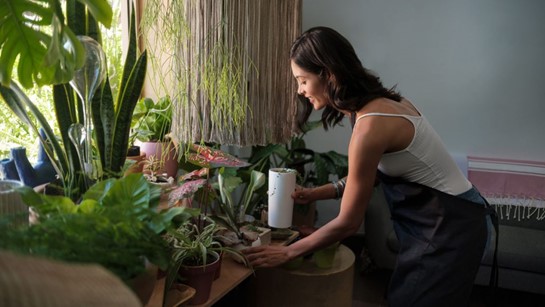Clean the Air with Indoor Plants
31 Oct 2019
How Plants Clear the Air
Are plants the best way to purify the air in your home? Indoor air can be up to can be up to 1,000 times dirtier than outdoor air. The EPA estimates that most Americans are exposed every day to indoor air contaminants than can lead to serious health problems including cancer, respiratory ailments, fatigue and headaches. The air you are breathing in your home is likely contaminated with pollutants and toxic chemicals such as:
• Dust and dirt
• Dander (from pets and humans)
• Paint fumes
• Outgassing from synthetic carpet, curtains, fire retardants, glues, cleaning solutions, pressure treated wood, perfume, personal care products, and even your synthetic clothes
• Cooking and tobacco smoke
• Carbon monoxide
• Mold
• Bacteria
• Viruses
• Pollen
• A whole host of harmful Volatile Organic Compounds (VOC’s) such as formaldehyde, benzene, ammonia, xylene, and potentially thousands more.
While a standard fiber weave furnace filter will remove most suspended pollutants larger than 50 microns a High Efficiency Particulate Air (HEPA) filter will remove most suspended pollutants down to 0.3 microns. However, neither type of filter is effective at removing dissolved pollutants such as Volatile Organic Compounds (VOC’s.) Even a carbon filter is only effective in removing VOC’s if the fan runs continuously and you change the filters regularly. This uses up electricity and the used air filters contribute to toxic waste accumulation in landfills. Changing the filters exposes you to a substantial concentration of toxins during the replacement process.
House plants are not only an attractive addition to any home but they also moonlight as efficient air purifiers. All you need to add is water! Plants convert carbon dioxide into oxygen through the process of photosynthesis. Root-associated microbes convert toxins in the air into nutrients the plants eat and thrive on. House plants become more effective over time while HEPA air cleaners become less effective over time. House plants are also less expensive and naturally more attractive than any HEPA filter unit.
While all plants are beneficial for improving the quality of the air, some are clearly better than others. Some plants are capable of removing up to 90% of VOC chemicals dissolved in the air in just twenty-four hours! Here are my favorite six house plants for clearing the air:
Wheatgrass
• The best air purifying plant
• Enhances the oxygen in the air
• Generates healthful negative ions
• Wheatgrass juice is nature’s finest medicine and is more than twenty times denser in nutrients than other choice vegetables.
Boston Fern
• The second best air purifying plant
• Removes formaldehyde
• Prefers plenty of light
• Keep the soil moist and mist the leaves often
Aloe Vera
• Removes formaldehyde
• Good for cuts and burns on the skin
• Needs well drained soil
• Prefers plenty of light
• Water only once a week
Dwarf/Pygmy Date Palm
• Removes xylene
• Removes ammonia
• Prefers plenty of light
• Keep well watered
English Ivy
• Removes benzene
• Cleans air of cigarette smoke
• Removes formaldehyde
• Great for those suffering from asthma and allergies
Golden Pothos
• Removes carbon monoxide
• Removes formaldehyde
• Prefers plenty of light
• Water less in colder temperatures
In general, you will need one plant (10-12 inch pot) for a small room and two or three plants for a large room to effectively clear the air. Fertilize once every two weeks with a side dressing of compost or compost tea. Dust the leaves once a month with a damp cloth. Use pots with holes in the bottom with a drain saucer. Place a bunch of pebbles in the bottom of the pot and add well-draining potting soil on top. Be sure not to overwater, as too much soil moisture can lead to mold growth. Empty the drain saucer if it accumulates water.
Play classical music to your plants and speak to them with loving intentions. Enjoy the simple beauty of house plants while your lungs benefit from their natural air cleansing action.